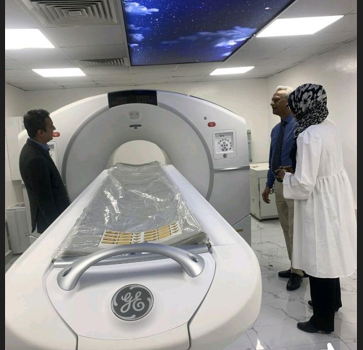 Cancer screening equipment at a hospital in Nairobi. Once a diagnosis is confirmed, physicians develop a treatment plan based on the Ministry of Health’s treatment. guidelines.
Cancer screening equipment at a hospital in Nairobi. Once a diagnosis is confirmed, physicians develop a treatment plan based on the Ministry of Health’s treatment. guidelines. Today, this is changing. The Social Health Authority (SHA) has introduced a fully coordinated pathway that guides patients from diagnosis to treatment and beyond, providing support at every stage.
The Cabinet Secretary for Health recently highlighted this progress during an update to the National Assembly, where he detailed how SHA is enhancing equity, flexibility, and coverage for cancer patients.
No longer constrained by rigid limits or fragmented care, patients now receive tailored treatment, including surgery, chemotherapy, radiotherapy, and critical care, while essential medical supplies and medications are covered. This is a system designed around patient need, restoring hope and dignity to the cancer journey
The journey begins at a primary care facility, where patients are assessed and referred to higher-level contracted hospitals for diagnostics or specialised treatment. This structured pathway prevents unnecessary self-referral, ensures continuity of care, and protects patients’ benefit entitlements.
Historically, cancer diagnosis was not covered under public financing. This stage is critical, as it allows clinicians to accurately determine the type and stage of cancer before treatment begins. Diagnostic tests, including histology, immunohistochemistry, tumour markers, MRIs, CT scans, PET scans, and bone scans, are covered under the oncology benefits package at clearly defined tariffs.
If the oncology package limit is reached, patients can still access imaging services through the household benefit package, ensuring uninterrupted care. When fully utilised, SHA supports the cost of these diagnostic services at approximately Sh120,000 per patient.
Once a diagnosis is confirmed, physicians develop a treatment plan based on the Ministry of Health’s treatment guidelines. This model standardises regimens, drug choices, dosages, and cycles, reducing unnecessary variations and improving outcomes. Treatment guidelines are automated into SHA’s digital systems, allowing seamless pre-authorisations and reducing paperwork delays.
One of the most significant reforms is the removal of rigid caps on chemotherapy cycles. Instead of being restricted to six annual cycles as before, patients now receive clinically indicated sessions within a flexible annual limit. This ensures care is driven by medical need, not administrative ceilings.
Patients receive the chemotherapy administration at Sh5,500 per session and medications covering up to Sh400,000. Advanced therapies, including brachytherapy, SBRT/SBRS, radiotherapy, hormonal therapy, and immunotherapy, are also included.
Surgical procedures are covered under a separate surgical benefit package, including biopsies (Sh16,800–Sh50,000), TURBT for prostate cancer (Sh168,000), and mastectomy for breast cancer (Sh134,000), reducing the financial shock at critical stages of treatment.
For patients requiring intensive care, inpatient admission includes access to critical care services at Sh28,000 per day for up to 12 days, as well as palliative care when needed.
While the oncology package limit is Sh550,000, comprised of Sh400,000 from SHIF and Sh150,000 from ECCIF, the actual value of coverage extends far beyond this.
The SHA benefits package is designed to provide complementary coverage across multiple services. Cancer patients continue to access a wide range of benefits, including inpatient care, surgical procedures, and general household radiology services, among other benefits.
When utilised, these combined services can provide total support of approximately Sh1 million per patient per year, including the Sh550,000 allocated specifically for the oncology package.
SHA has contracted 140 healthcare facilities nationwide to deliver cancer care. To date, 33,101 patients have benefited from the oncology package. The Authority has paid out Sh5.8 billion in cancer claims, with an additional Sh774.6 million under processing, demonstrating both reach and accountability.
Aware of the changing economic landscape, rising disease burden, and escalating healthcare costs, SHA has been actively engaging with both patients and healthcare providers to gather feedback on the current benefit package. Through this process, we have received valuable input and several value propositions aimed at enhancing the scope and effectiveness of coverage.
In response, SHA has forwarded these recommendations to the Benefits Technical Advisory Panel (BTAP) for detailed review and consideration. We are also providing support to ensure a comprehensive evaluation of the proposed enhancements. Looking ahead, we anticipate an expansion in the benefit allocation, as the Ministry of Health (MoH) has expressed its commitment to actualise the recommendations put forward by the BTAP.
Additionally, SHA has implemented targeted measures to reduce cancer treatment costs, ensuring that patients avoid out-of-pocket expenses. To make essential medicines more affordable, SHA is implementing the MOU negotiated by the Ministry of Health with Major private healthcare providers, including Roche Pharmaceuticals, to reduce the price of medicines like Herceptin for breast cancer from Sh120,000 to Sh40,000 per cycle, giving thousands of patients access to life-saving treatment within SHA rates and without co-pay.
The impact of SHA’s reforms goes beyond bills and reimbursements. They are rebuilding trust; trust that a cancer diagnosis does not have to lead to financial ruin, trust that government health programs can be equitable and patient-centred, and trust that every Kenyan has the right to fight cancer with dignity.
Dr. Mercy Mwangangi is the Chief Executive Officer at the Social Health Authority (SHA)














